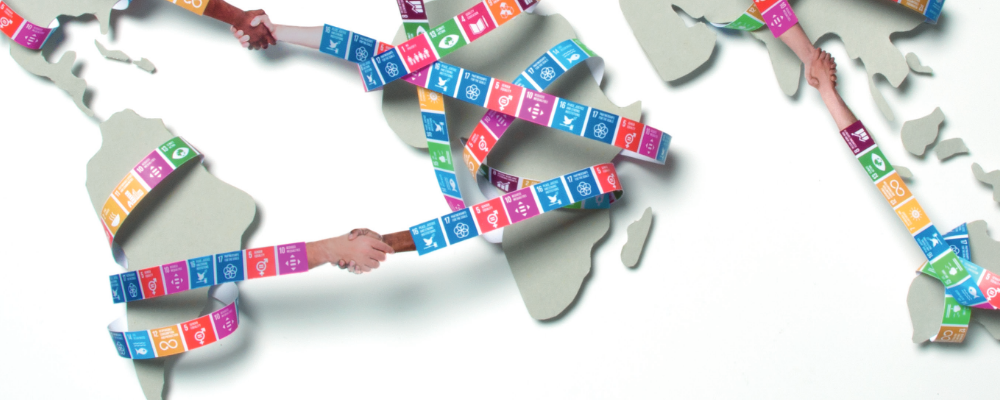Publications
Here you will find FGG Long Reads. These publications are a joint effort of members and partners to reflect on the discourse of international collaboration related to FGG's field of work.
Six recommendations to coherently realise the SDGs
Tue 15 Sep 2020 | 15 min read
The United Nations’ Sustainable Development Goals (SDGs) provide an unprecedented and invaluable opportunity in the direction of global transformative change of societies and the environment for the good. This paper sheds light on this transformative power of the SDG agenda. It shows the opportunities that are available to assure coherence and the precedence of people and the planet in the realisation of the SDGs, not least via the transformative solutions that grassroots organisations, communities, and civic movements from around the world put forward. And it presents six concrete recommendations that could help governments to implement policies and practices to realise the SDGs as such that they fulfill their potential: “peace and prosperity for people and the planet, now and into the future”.
5 Ways for Expanding Civic Space
Wed 10 Jul 2019 | 20 min read
A thriving and open civic space is a necessity for civil society actors to exercise their rights, access information, voice their views, organise, engage in and, most importantly, meaningfully influence their world: we need a thriving civil society to fundamentally transform our societies for the sake of people and our planet. However, civic space is under continuous and increasing pressure. We see Bangladeshi unions in the garment industry being repressed, direct foreign investment being prioritised over the land rights of agrarian communities in Myanmar, and many more devastating developments taking place, often negatively influenced by economic actors and factors. One of the greatest opportunities for the Dutch Ministry of Foreign Affairs to facilitate positive change for people and the planet is to protect and expand civic space. The Fair, Green and Global Alliance’s latest publication shows five ways to do so.
Tags
Mutual Capacity Development
Fri 06 Oct 2017 | 30 min read
In the words of the Dutch Ministry of Foreign Affairs, ‘strong civil society organisations make it easier to hear the voice of the people’. FGG believes this is true both within a country’s borders and beyond them. A remote voice can best be heard when the signal is transmitted loud and clear, received loud and clear, and relayed loud and clear. Global cooperation is all the more important given the current context of ‘shrinking space’ for civil society engagement. In many countries, including democratic ones, civil society actors are facing an increasingly hostile environment. The ability to organise, assemble, operate, raise and secure funds, not to mention express dissent, is increasingly limited by repressive policies, laws and practices, including intimidation and violence perpetrated by both non-state and state actors against human rights defenders. This is especially true for groups at the frontlines of the struggle for inclusive, sustainable development: grassroots, community-based, social, economic, political, environmental and gender justice movements. Now more than ever, strong, well-networked civil society actors are needed everywhere around the world to resist this trend.
FGG works to strengthen civil society actors to advocate and lobby for socially just, inclusive and environmentally sustainable societies using what we call a mutual capacity development approach. This publication, which was inspired by stimulating discussions with the Dutch Ministry of Foreign Affairs, describes in detail what we mean by mutual capacity development and why we believe it is the most effective approach for fair, green and global change.
10 Recommendations to effectively lobby and advocacy
Wed 16 Apr 2014 | 15 min read
Lobbying and advocacy, or policy influencing, is a powerful tool. It is used to address systems, rather than symptoms. Advocating for better policies generates positive change for disadvantaged people, groups and countries. Its reach is vast, and its approach tackles the systematic causes of problems, thus empowering local voices and promoting the sustainable development of countries in the global south. Lobbying and advocacy means acting as a watchdog, and much more than that. It concerns cooperating, establishing networks and partnerships, complementing each other’s work, conducting in-depth, long-term research, responding flexibly to new knowledge and opinions, developing alternatives and persistently pursuing policy reform.
Balancing Trade and Aid
Sat 16 Feb 2013 | 15 min read
With the arrival of the Rutte II cabinet in 2012, a wish of the members of the Fair, Green and Global (FGG) Alliance came true; international trade and development cooperation –‘trade and aid’- came under the supervision of the same minister. This opened up the way for a stronger focus on (and advocacy for) policy coherence. Because: policy coherence in rich countries is the key to sustainable and equitable development around the world. To actually help strengthen both international trade and development cooperation, Minister Ploumen was –and Minister Kaag currently is- engaged in a balancing act.






















